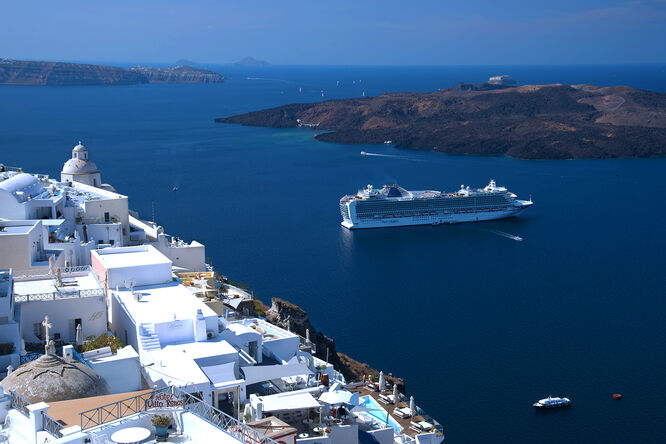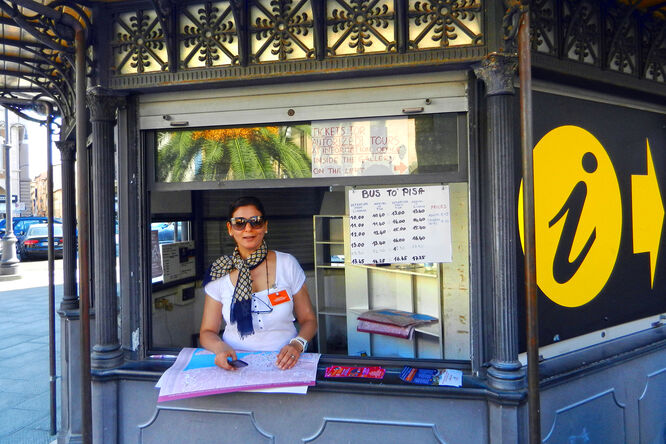Cruise Control: How to Sail Smartly in Europe
By Rick Steves
I've spent the last several decades exploring Europe from every conceivable angle. And this includes checking out Europe the way millions of people do — from a cruise ship.
I'm not out to promote or put down cruising. For some people it's a great choice, and for others it's not. On the plus side, cruising can be economical, with transportation, a room, and meals all included in one price. It can be ideal for those who want their vacation logistics taken care of. And toggling from a floating resort to exciting days on shore — nearly each day in a different country — can be efficient if you want to sample a range of places in a short time.
Cruise ships offer plenty of onboard fun, but to me the destinations are the reason to set sail. The trick is deciding how to best experience them. Many would say cruising can insulate you from the "real Europe." You're going to the most famous places and seeing them at the same time as thousands of other tourists.
Navigating crowds is indeed one of cruising's challenges. Ships can be huge — the last Mediterranean cruise ship I sailed on had about 3,000 passengers. To avoid the hordes, get out as early as possible and come back as late as you can. Doing this, you'll enjoy fewer crowds and more unforgettable moments.
You don't have to purchase the cruise ship's sightseeing package to have an enjoyable time on shore. In most port terminals, reputable companies offer essentially the same tours as the cruise lines for a fraction of the cost. Another option: Book a private guide in advance. It's a comfort to be met at the port with a warm personal welcome. You can share the cost: Four people hiring a guide with a car costs about the same as four people taking the cruise excursion. And with a guide, you get your own private teacher, you won't get lost, and you enjoy the freedom to go at your own pace.
You can also simply be your own guide. The well-organized traveler can do a lot during an eight-hour stop. Most ports offer helpful tourist offices, and are well-served by public transit. For example, with a good guidebook and public transportation, exploring the French Riviera is a snap. Frequent trains link the cities along the coast, and Nice — the Riviera's hub — will soon have a tramline connecting the city center right to its cruise port.

In many big cities, hop-on, hop-off bus companies offer do-it-yourselfers economic and efficient transportation. Buses meet the cruise ships at the port and offer big loop tours that connect major sights, allowing you to hop off and on all day long, and dropping you back at the port.
Create your ideal vacation. You have the option to stay onboard and relax. Or take it easy on shore: Simply walk or catch a ride to the town center and enjoy a free day — shopping, browsing, sipping a drink, or soaking up some sun on the beach. Be creative. Mix it up. Your goal: Get the most out of your vacation time and money, enjoy the best experiences, and have fun.
In some ports, such as Naples, the scene can feel aggressive. Stepping through the port security gate, you may find yourself in a scrum of assertive cabbies and tour guides. If you're skipping the cruise line's organized excursions, remember that cruise ports attract hustlers and con artists planning to overcharge naive tourists. Research the regulated taxi prices or book a local tour or guide in advance.
The food on a cruise ship generally ignores the cuisine of whatever port you're visiting — so when I'm lunching on land, I choose authentic local food designed to be eaten quickly. Each country has its iconic quick-and-easy meal. In Naples — it's got to be pizza. It's tapas in Spain. In southern France, I love a good salade niçoise. In Greece, I'll look for a souvlaki pita.
One bonus to cruising is the scenic arrivals and departures. Being on the top deck as the ship approaches the day's destination gives me a quiet, bird's-eye view. The sight of an exotic and fabled Greek island like Santorini — as the moon sets and the sun rises, just kissing the lip of the breathtaking cliffs — is worth getting up for.
A cruise can be what you make of it: a prepackaged travel cliché, or a springboard for independent spirits. As with travel in general, for cruisers, lifelong memories can be yours when you know your options and then match them with your personal style of travel.

